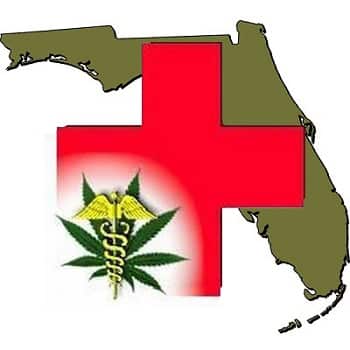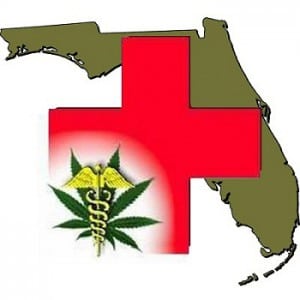Could Florida be the first state in the South to approve medical marijuana? A bill that would have done that was stymied this year in the legislature, but its proponents have vowed to continue the fight next year. And in the meantime, a move to put a constitutional amendment that would allow medical marijuana on the November 2014 ballot is moving forward.
Florida initiative organizers face an uphill battle. To make next year’s ballot, petitioners must come up with some 683,419 valid voter signatures by February 1. Last week, the initiative campaign, known as United for Care, passed its first hurdle, turning in more than 110,000 signatures to trigger a state Supreme Court review of its language. Only 68,000 valid signatures were needed, but organizers wanted a nice cushion to ensure that they have the necessary numbers.
While awaiting the Supreme Court’s imprimatur, the paid signature gathering campaign is on hold, although volunteer efforts continue. Once the high court gives its okay, phase two of the signature gathering will get underway, with more than a half million needing to be gathered. Organizers are looking to turn in signatures by the end of the year, ensuring they are verified in time for the February 1 deadline.
The state, the nation’s fourth most populous with nearly 20 million people, is not an easy place to run an initiative. Needing hundreds of thousands of signatures means an extensive paid signature gathering campaign, as well as volunteers, and that’s just to make the ballot. The state’s multiple media markets mean it will take millions of dollars more in late advertising to ensure that the initiative actually passes come election day.
Circulating under the ballot title “Use of Marijuana for Certain Conditions,” the initiative would allow for the medicinal use of marijuana for a list of specified conditions as well as “any other conditions for which a physician believes that the medical use of marijuana would likely outweigh the potential health risks for a patient.”
It would set up a system of state-regulated marijuana cultivation and distribution centers and would provide ID cards to patients and caregivers. But it would not allow patients or caregivers to grow their own.
At this stage of the game, advocates are certain they will succeed and are chomping at the bit.
“We are absolutely going to make the 2014 ballot,” vowed Kim Russell, founder of People United for Medical Marijuana (PUFMM), which is running the United for Care campaign. “And we’re very confident the Supreme Court will approve the wording.”
Russell has some reason for her confidence. The initiative was written by Florida constitutional attorney John Mills, one of the state’s foremost experts on initiatives, and a man who has written more than a dozen initiatives that have passed Supreme Court muster.
“We’ve got the best, and I’m sure this is going to be approved,” said Russell.
A Florida initiative won’t be cheap. Russell estimated that it would take between $2 ½ million and $5 million just to make the ballot, and another $5 million in advertising in the run-up to the 2014 election. But the campaign has had an early boost with the presence of John Morgan, a major Democratic Party fundraiser, who is now chairman of the campaign’s political action committee.
In addition to paid signature gatherers, the campaign is relying on an extensive network of volunteers to make the ballot and it is working with existing activist groups.
The Florida Cannabis Action Network (FL CAN) has been concentrating its efforts on getting a medical marijuana bill through the legislature. Despite intense lobbying, it didn’t happen this year. FL CAN remains committed to getting a bill through next year, but is also organizing volunteers to gather signatures for the initiative.
“Getting the Cathy Jordan Medical Marijuana Act passed is our Plan A,” said FL CAN director Jodie James, “but the initiative is Plan B. The initiative has licensed dispensaries, but no personal cultivation, but we’re still putting our energy behind the amendment. Florida CAN will do whatever we need to ensure that patients in this state don’t have to be afraid. If we don’t succeed in the legislature, we want to make sure we have enough signatures to get on the ballot in 2014.”
Cathy Jordan is perhaps Florida’s most well-known medical marijuana patient. The Parrish resident is a long-time sufferer of amyotrophic lateral sclerosis (ALS, commonly known as Lou Gehrig’s Disease), and she and her husband have been lobbying for years to win the ability to legally use marijuana to treat her symptoms.
It is her name that adorned this year’s thwarted medical marijuana bill, and it was a February raid on her residence by local law enforcement after she went public with her lobbying that helped focus outrage on the state’s last-century approach to the healing herb.
“It’s not exactly what we would have done, and it leaves some things to be desired, such as not being able to grow your own, but I have to give John Morgan credit,” said Jordan’s husband Bob. “He brought a lot of interest and money to it, and while we may be on different paths, we’re going toward the same destination.”
“We’re working with him because we all want basically the same thing,” said Cathy Jordan, her voice barely understandable due to the effects of her disease. “We think our bill is a better and faster fix because they can work all this stuff out. The legislature says the bill is too big, too bulky, but they need to do their job. But with the bill and the initiative, we’re all heading for the same place.”
But while they’re looking to the legislature, the Jordans are also working to help the initiative.
“We were out getting signatures here in Bradenton this weekend,” Bob Jordan related. “I ran into an Iraq and Afghanistan veteran who wants to use cannabis, but he can’t. In states where it’s legal, he could use it, but here, he’s a criminal. This guy is ready to eat a bullet. This is definitely a vets’ issue, too.”
While both the Jordans and FL CAN grumbled about no personal cultivation, Russell said there was good reason not to include personal grows.
“We did a lot of polling before we wrote the initiative; we had to make sure this thing could not fail,” she said. “We got 70% for medical marijuana, but when we asked about growing it, the approval rate dropped to 30%. If you’re spending this much money, time, and effort, you can’t take a chance on losing.”
National reform groups are watching with interest.
“It’s a daunting process down there, but it sounds like there is a lot of energy and potentially a lot of resources,” said Tvert. “We hope they qualify, and we certainly hope they’re successful. A whole lot of old people would find relief for their ailments.”
Turning Florida medical marijuana green would be a big deal, Tvert said.
“It’s the largest state in the South. If Florida passed this, the number of people living in medical marijuana states would increase dramatically. There is significant support for this initiative; we hope that support will be reflected in the months to come.”
Pressure for medical marijuana has been building for years now, and it looks like 2014 is the year. Whether via the legislature or via the initiative process, Florida appears poised to join the ranks of the medical marijuana states.
Article From StoptheDrugWar.org - Creative Commons Licensing - Donate






